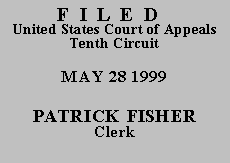

| CHARLES WAYNE GEORGE,
v.
STORMY WILSON |
No. 99-5025
(D.C. No. 96-CV-1075-K) |
On June 30, 1992, Petitioner-Appellant Charles Wayne George ("George") entered a plea of guilty in Oklahoma state court on two counts of Larceny of Merchandise From a Retailer, After Former Conviction or Two or More Felonies. See Okla. Stat. Ann. tit. 21, § 1731 & § 51. Based on Oklahoma's recidivism statute, George was sentenced to two concurrent terms of 30 years' imprisonment. George filed no direct appeal, but did file an application for post-conviction relief in Oklahoma, alleging that he received: (1) an excessive sentence; (2) improper sentence enhancement; and (3) ineffective assistance of counsel. His application was denied by an Oklahoma trial court, and that decision was affirmed by the Oklahoma Court of Criminal Appeals.
On August 14, 1996, George filed a pro se petition for a writ of habeas corpus in the United States District Court for the Eastern District of Oklahoma, which was transferred to the Northern District of Oklahoma. After resolving some pleading deficiencies and being granted in forma pauperis status, George filed an amended petition for a writ of habeas corpus on November 25, 1997 alleging: (1) "Excessive and Disporportinate [sic] sentence" (also characterized as a "14th Amendment, Due Process Violation"); (2) "Improper Enhancements"; (3) "Incompetency"; and (4) "Erroneous instructions as to the range of punishment for the crime."
The magistrate judge, to whom the matter was referred, proposed finding that the sentencing claim (combining issues 1 and 2) was procedurally barred and the incompetency (issue 3) and ineffective assistance of counsel (issue 4) claims lacked merit. Accordingly, the magistrate recommended that George's petition be denied. George objected to the magistrate's report and recommendation as follows:
The Petitioner objects and takes issue with the Report in it's [sic] entirety and does so for the purposes of preserving all appeal rights. Petitioner asserts that the United States District Judge reviewing this matter should revue [sic] this report and recommit the matter for an evidentiary hearing as prayed for by the Petitioner. Otherwise Petitioner would take exception to any ruling and give notice of his intent to appeal.
The district court adopted the magistrate's report and recommendation and denied George's petition for a writ of habeas corpus. Thereafter, the district court denied George a certificate of appealability.
After careful review of the record and the magistrate's report, we conclude that the appellant has failed to make a substantial showing of the denial of a constitutional right. See 28 U.S.C. § 2253(c)(2). Thus, we deny George's application for a certificate of appealability.
The mandate shall issue forthwith.
ENTERED FOR THE COURT
David M. Ebel Circuit Judge
*.After examining appellant's brief and the appellate record, this panel has determined unanimously that oral argument would not materially assist the determination of this appeal. See Fed. R. App. P. 34(a)(2) and 10th Cir. R. 34.1(G). The case is therefore ordered submitted without oral argument. This Order and Judgment is not binding precedent, except under the doctrines of law of the case, res judicata, and collateral estoppel. The court generally disfavors the citation of orders and judgments; nevertheless, an order and judgment may be cited under the terms and conditions of 10th Cir. R. 36.3.